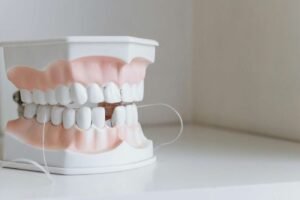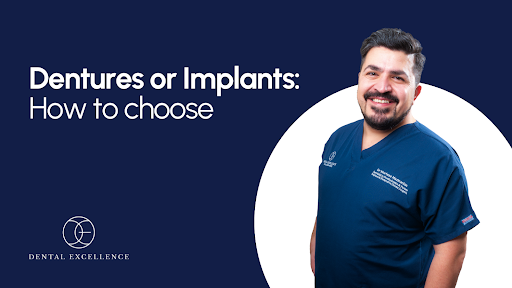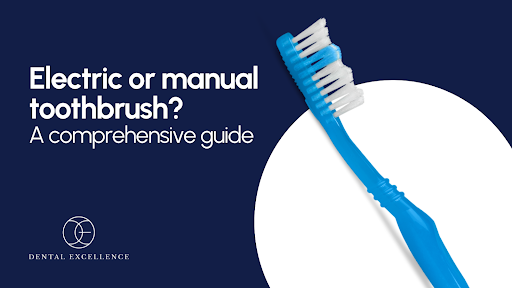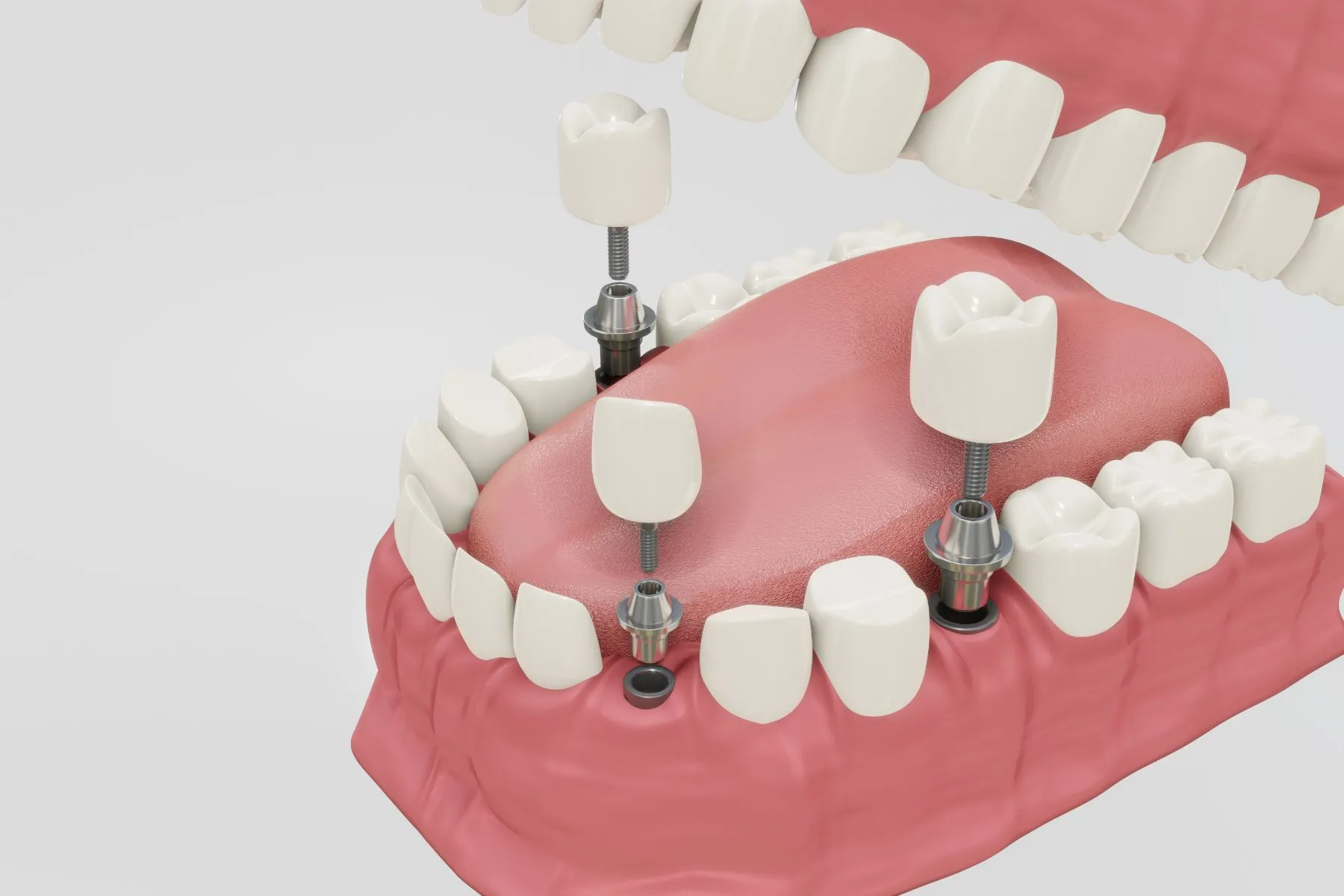Denture or Implants: How To Choose
Choosing between dentures and implants can be a significant decision for anyone looking to restore their smile. Generally speaking, dentures offer a removable option, while implants provide a fixed solution.
In this article we will delve into these two options and analyse the pros and cons in detail.
What are Dentures?
Dentures are removable prosthetic devices used to replace missing teeth and surrounding tissues. There are two main types: complete dentures, which replace all teeth in either the upper or lower arch, and partial dentures, which replace only some missing teeth while preserving any remaining natural teeth.
Can Dentures be Fitted to Receding Gums?
Yes, dentures can be fitted to receding gums. However, receding gums may present challenges in achieving a proper fit, leading to discomfort and reduced functionality. Dentists can adjust dentures to accommodate changes in gum tissue, but frequent adjustments may be necessary as the gums continue to recede. Ideally receding gums need to be addressed prior to denture construction.
How to Clean Dentures
Proper cleaning is essential for maintaining the longevity and hygiene of dentures. Dentures should be brushed daily with a soft-bristled brush and denture cleaner. It’s important to handle dentures carefully to avoid damage and to soak them in water or a denture solution overnight to keep them moist and prevent them from warping.
How Long Do Dentures Last?
The lifespan of dentures varies depending on factors such as quality, maintenance, and changes in oral health. On average, dentures may last between five to seven years before needing replacement. Regular dental check-ups and adjustments can help prolong their lifespan and ensure optimal functionality.
What Are Dentures Made Of?
Dentures can be made from various materials, including acrylic resin and cobalt chrome metal.
Acrylic resin is commonly used for the base of dentures due to its durability and ability to match the colour of natural gum tissue.
Cobalt chrome metal is often used for partial denture frameworks because of its strength, durability, and resistance to corrosion, providing a stable and long-lasting foundation for the denture.
Porcelain or ceramic may be used for the artificial teeth due to their natural appearance and strength.

How Much are Dentures?
The cost of dentures varies based on factors such as the type of dentures and materials used. On average, complete dentures can range from £700 to £2000, while partial dentures are generally less expensive. Additional costs may include consultations, adjustments, and maintenance over time.
Dental Implants: The Most Comfortable Solution
Dental implants offer a permanent and comfortable solution for replacing missing teeth. Unlike dentures, implants are anchored directly into the jawbone, providing stability and mimicking the natural function of teeth.
What Are Dental Implants?
Dental implants are titanium posts surgically inserted into the jawbone to serve as artificial tooth roots. Once implanted, they fuse with the bone through a process called osseointegration, providing a stable foundation for artificial teeth, such as crowns or bridges.
Are Dental Implants Painful?
The placement of dental implants is performed under local anaesthesia, ensuring zero pain during the procedure and minimal discomfort in the postoperative phase. Some patients may experience mild soreness or discomfort afterward, which can be managed with over-the-counter pain medication prescribed by the dentist. Any medication needed post implant placement will be provided to you before leaving Dental Excellence.
How Long Does a Dental Implant Take?
The process of getting dental implants can take several months and involves multiple stages, including initial consultation, implant placement surgery, osseointegration (bone integration), and the attachment of artificial teeth. The exact duration varies depending on individual healing and treatment plans.
Immediate loading implantology reduces this time, as the temporary prosthesis is placed on the implants right after implant placement.
How Long Will a Dental Implant Last?
With proper care and maintenance, dental implants can last a lifetime. Unlike dentures, which may require replacement every few years, dental implants are designed to be a permanent solution for missing teeth, providing long-term stability and functionality. However it is always recommended to perform checkups and professional teeth cleaning every 6 months and maintain a strict oral hygiene.
How Much Are Dental Implants?
The cost of dental implants varies depending on factors such as the number of implants needed, the type of restoration, and any additional procedures required, such as bone grafting. While dental implants tend to have a higher initial cost compared to dentures, their durability and long-term benefits often make them a worthwhile investment.
Dentures or Implants: pros and cons
Dentures: pros and cons
Pros include affordability, versatility in fitting various dental situations, and easier adjustment for those with receding gums. However, cons involve potential discomfort, reduced biting force compared to implants, and the need for regular maintenance.
Implants: pros and cons
On the other hand, implants offer stability similar to natural teeth, superior chewing ability, and long-lasting durability. However, they require a surgical procedure, which might not be suitable for everyone, and they tend to be more expensive than dentures.
In Conclusion: Are Dentures or Implants Better?
Ultimately, the choice between dentures and implants depends on individual preferences, budget, and oral health needs.
Ultimately, the decision between dentures and dental implants is a personal one, influenced by a range of factors including your individual preferences, budget, and specific oral health needs. Both solutions have their advantages and considerations, and understanding the differences can help you make an informed choice about which option is best suited for you.
Dentures: An affordable and versatile option
Dentures are a widely used, cost-effective solution for replacing missing teeth, particularly for those who are looking for an affordable way to restore their smile and functionality. Dentures can be either full or partial, depending on the extent of tooth loss, and they can be easily adjusted or replaced as needed. They offer a non-invasive solution, meaning that no surgical procedures are required, and this can be appealing for individuals who prefer to avoid more invasive dental work.
However, there are some limitations to consider. Dentures can sometimes feel less stable than natural teeth or dental implants, especially when eating certain foods, and they may require frequent adjustments over time as the structure of your mouth changes. This can be due to natural bone loss or gum recession that occurs after tooth loss. In addition, dentures need to be removed for cleaning and often require the use of adhesives to keep them securely in place throughout the day.
Dental implants: Stability, comfort, and longevity
Dental implants, on the other hand, provide a more permanent and stable solution for missing teeth. They are surgically placed into the jawbone, where they fuse with the bone over time, offering superior support for artificial teeth such as crowns, bridges, or dentures. This process, known as osseointegration, ensures that implants function just like natural teeth, providing excellent stability and comfort when eating, speaking, or smiling.
While implants are considered the gold standard in tooth replacement due to their natural feel and function, they do involve a higher initial investment and require good overall oral health, including sufficient bone density for successful placement. The procedure is more involved compared to dentures, with multiple stages often required over several months, but the long-term benefits make them the preferred choice for many individuals seeking a permanent solution.
Making the right choice for you
When deciding between dentures and dental implants, it’s important to consider not only the financial aspects but also your lifestyle, oral health goals, and comfort. Dentures provide a quicker, non-invasive, and budget-friendly option, especially for those who may not be candidates for surgery. On the other hand, dental implants offer unmatched durability, comfort, and stability, giving patients a permanent and reliable solution that closely mimics natural teeth in both appearance and function.
At Dental Excellence in Chalfont St. Giles, Buckinghamshire, we are here to guide you through the process, discussing the pros and cons of both dentures and implants to help you make a well-informed decision that suits your oral health and lifestyle.
Do you want to know the best option based on your individual circumstances and goals? Call us today on 01494876128 or email us on contact@dentalexcellence.co.uk.






